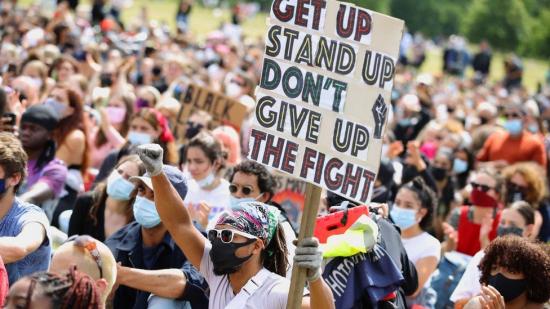COVID-19 has been used by multiple states to restrain civil society. As we feared, governments have not relinquished their control as the pandemic evolves from an emergency to a part of everyday life. AFSC has been tracking responses to COVID-19 and civic space since the pandemic began, with a particular focus on freedom of movement, speech, and the right to protest. During the pandemic, the penalties for protesting have ramped up around the world. Outlawing demonstrations has been possible during states of emergency with suspended democratic processes and framed as a necessary health precaution.
It is important to note that civil society has stood against these restrictions with tremendous impact during the pandemic—and has met community needs and filled government gaps on the ground. Civil society actions around the world have protected pockets of civic freedoms, through active nonviolent means, giving power and strength to others standing up for their rights. There are numerous examples of this, through the AFSC small grants case studies, and CIVICUS reports documenting brave impactful actions and wins.
AFSC has worked to protect civic space for decades. From 2015 we recognised an acceleration of restrictions as low-income states introduced ‘NGO laws’, which increased the control over civil society organisations. The laws made it harder for NGOs to register and undertake their work without state interference. These laws seriously impacted democratic engagement around the globe and were presented as part of the ‘war against terror’ to prevent money laundering. The laws controlled NGO activities and demanded It is worth noting that such laws were called for by donors. Aid recipients instigated and misused the laws to muzzle and / or eject political opposition and human rights defenders. Amnesty International said in 2019, ‘In the past two years alone, almost 40 pieces of legislation that interfere with the right to association and are designed to hamper the work of civil society organizations have been put in place or are in the works around the world. These laws commonly include implementing ludicrous registration processes for organizations, monitoring their work, restricting their sources of resources and, in many cases, shutting them down if they don’t adhere to the unreasonable requirements imposed on them’ . It would be fascinating to evaluate the impact of this raft of laws and see if they have been of any benefit at all.

The anti-terrorism agenda gave license to low-income countries to restrict civil society. Migration and COVID opened the door for rich countries to restrict movement, public gatherings, and the right to protest. Migrants have been framed as a threat and labelled as vermin . Demonstrators during the pandemic were labelled as ‘super-spreaders’ , including those who demonstrated against the killing of George Floyd on 25th May 2020, and those who stood up for the Black Lives Matter movement.
The state of COVID-19 emergency is passing, but state-led injustices overriding basic human rights continue. AFSC is preparing for the next phenomenon on the continuum, justifying greater state-control. Mass media shifts in the framing of particular groups as a threat can be an indicator that a new wave of scapegoating is beginning, and we are seeing this with environmental activists. Watch this video on 'The 5 Filters of the Mass Media Machine':
‘A record number of activists working to protect the environment and land rights were murdered last year, according to a report by a campaign group. 227 people were killed around the world in 2020, the highest number recorded for a second consecutive year,' the report from Global Witness said.
Along with the impact on people’s lives of global warming, rising fuel and food costs are spurring public anger and protests at economic mismanagement. Reuters says ‘Sharply higher interest rates, red-hot inflation and a prolonged energy crisis are leading to conviction that the world economy is headed inexorably towards recession’ . As we know, people and countries without economic resilience do not have the means to absorb the impact. Protests, whatever the consequences, will take place, as people have little to lose and demand support. Could this become a time where mass movements around the world unite, and begin to hold governments accountable to their charge of protecting citizens from violence and from the worst vicissitudes of life?
One of the five key findings in the CIVICUS 2022 State of Civil Society Report is that ‘current crises are exposing the inadequacies of the international governance system’, with specific mention of UN bodies and interpol. The authors say ‘If the UN is to move from helping to prevent crises rather than trying to react to them, effective civil society engagement is needed. The world as it stands today, characterised by crisis and volatility, needs a UN prepared to work with civil society, since civil society continues to seek and secure vital progress for humanity’. They believe the UN will ‘drift into irrelevance’ if it does not engage civil society. And they find the Security Council is not fit for purpose in its present state.
How can we channel the anger and the power of civil society to address and transform the inadequacies of the international governance systems for fair and just lives for all? AFSC is committed to helping communities protect civic space globally; we are working for systemic change by listening to needs from around the world.
As Under the Mask evolves into a new ‘Pilot Civic Engagement’ program, we will be working with civil society actors across the globe to identify, support, and co-ordinate efforts protecting civic space and strengthening civic engagement. A strategy could be to develop a coordinated two-pronged approach including civil society actions pressurizing local government from the ground up, aligned with advocacy messages aimed at national governments from global actors. We need your ideas and experiences to develop this work, and this is a focus of AFSC in the coming months.
Take action today and connect with us!
We want to hear from you! Will you take part in our online open discussion forum to share your ideas and important issues in your context? Please complete this form with your contact details and we will be in touch; you can also complete the form by scanning the QR code below. Alternatively, email us at UndertheMask@afsc.org with your name, country, and preferred language.

The forum will have Français, Español, العربية, မြန်မာ, Bahasa Indonesia interpretation available, and the form is provided in these languages also. We would be very grateful if you could share this form widely across networks: https://forms.office.com/r/Af06iJSiN0
Thank you for your interest! شكرا لك على اهتمامك! စိတ်ဝင်စားမှုအတွက် ကျေးဇူးတင်ပါတယ်! Merci de votre intérêt! ¡Gracias por su interés! Terima kasih atas minat Anda!